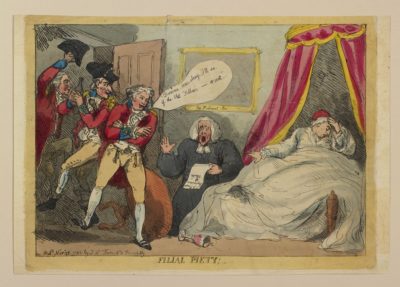
Thomas Rowlandson (1757-1827): Filial Piety! 25 Nov. 1788. The only known satirical cartoon depicting the King during his illness of 1788-9. The Royal Collection Trust: RCIN 810287.
So many features of King George III’s long reign are extraordinary in retrospect including the American and French Revolutions. Among the most extraordinary is the king’s long struggle with mental illness. George III’s mental illness, the efforts of his family, court, and doctors to manage and treat it, and historians and others’ subsequent efforts to understand his ailment in light of modern diagnostic criteria shed important light not only on the eighteenth century, but every subsequent era as it confronts ‘the madness of George III’.
This exhibition is staged in connection with an event at King’s College London on 5 November 2019 entitled Mental Health and the Georgian World: The ‘Madness’ of George III to mark five years of the Georgian Papers Programme.

Mark Gatiss in the Nottingham Playhouse production of The Madness of George III. (c) Nottingham Playhouse. Photo: Manuel Harlan
This event built in turn on the very successful 2018 collaboration between the Georgian Papers Programme, Nottingham Playhouse and NTLive! around the Playhouse’s production of Alan Bennett’s play The Madness of George III. The GPP arranged a briefing for the director and cast in rehearsal from one of the academic directors of the programme, Arthur Burns, and Sir Simon Wessely, professor of psychological medicine at King’s College London. This was followed by a visit by the leading actor in the production, Mark Gatiss to Windsor Castle to view an exhibition of documents associated with George and his illness, later mounted online as The Madness of George III Explored : An Exhibition for Mark Gatiss. The visit itself was recorded and featured prominently in a short film shown before the live relay of the production as part of NTLive! to venues in more than 65 countries across the world. The GPP also provided a contextual programme note written by Arthur Burns and fellow academic director, Karin Wulf, and a pre-show talk in Nottingham. Some images of documents which transformed into props allowed the actors to hold the very items mentioned in the text in their hands.
In conjunction with critical contemporary public attention to mental health, this collaboration set the GPP team thinking more generally about George III’s mental health. This is especially significant as the Georgian Papers Programme has now made the relevant medical papers, held in the Royal Archives at Windsor Castle, publicly available for the first time as part of its digitization programme.
Thus when it came to celebrate five years of the Programme, we could think of no better way of doing so than returning to this subject. Not only is the king’s mental illness of obvious and intrinsic interest, and remains a subject of scholarly discussion, but it is also an excellent example of how the Programme can inform key themes with immediate contemporary relevance. In particular, the documents in the exhibit when taken together with the reflection on how historians and other scholars have interpreted George III’s mental illness, from the 19th century to the 21st century, suggest how fully the king’s struggles can help inform our perspectives on the all too regular and yet often ignored or shamed subject of mental health care.
For Mental Health in the Georgian World we brought together a panel for discussion around the theme of George III’s mental health. Our panel consisted of Sir Simon Wessely, who had already written about George’s illness from his perspective as a practising expert in clinical psychiatry but with a keen awareness of its wider social setting (during the Nottingham production he was chairing the government’s review of mental-health legislation), the director and star of the Nottingham production, Adam Penford and Mark Gatiss, and two historians with distinct perspectives on mental health and illness in the Georgian world: Michael Brown, who has written about asylums in the eighteenth century, and Barbara Taylor, an expert on subjectivity and the self in the eighteenth century, but who has also written movingly about her own experiences in the mental health system in her book The Last Asylum. You can watch the discussion that ensued here.

Extract from NTLive! broadcast of the Nottingham Playhouse production of The Madness of George III by kind permission of NTLive & Nottingham Playhouse. Extract from ‘The Madness of George III’ by Alan Bennett (© Forelake Ltd) used by permission of United Agents on behalf of Forelake Ltd.
This exhibition is designed to complement the panel discussion and our previous exhibition for Mark Gatiss, as well as to provoke further reflection around this very important topic.
Arthur Burns is academic director in the United Kingdom for the Georgian Papers Programme, and professor of Modern British History at King’s College London.
Karin Wulf is North American academic director of the Georgian Papers Programme. She is executive director of the Omohundro Institute of Early American History and Culture and professor of history at William & Mary, USA
